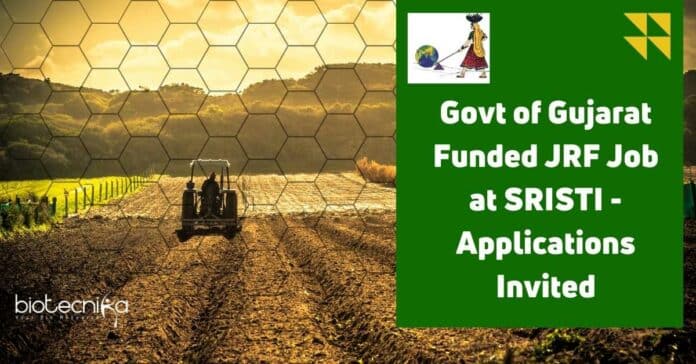SRISTI JRF Job Opening For MSc, MTech Agricultural Sciences Candidates
SRISTI JRF Job Opening For MSc, MTech Agricultural Sciences Candidates. SRISTI Junior Research Fellow job opening for MSc, MTech Agricultural Chemistry/Agronomy/Agricultural Sciences candidates. Interested and eligible applicants can check out all of the details on the same below
Possible Interview Questions for the Technical Round are posted below:
File No. SRISTI/LBNF/2023/0003
Advertisement for the post of Junior Research Fellow
Applications are invited from qualified candidates for the position of Junior Research Fellow (JRF) in a time-bound multi-institutional collaborative research project for a purely contractual period as per the following details:
Name of the Position: Junior Research Fellow (JRF)
No. of Positions: 01
Project Title: Low-Budget Natural Farming (LBNF): Underpinning the Gujarat agro-climatic zones’ soil-specific natural farming practices for sustainable and climate-resilient agriculture
Funding Agency: Gujarat State Biotechnology Mission, Government of Gujarat
Principal Investigator: Dr. Amarchand Chordia Murugan
Age Limit: Up to 31 years from the closing date of the advertisement
Fellowship Duration: Till the end of the project: 3 years (subject to satisfactory performance)
How to Apply:
For applications, please send a 1-page cover letter (highlighting your interest and relevant experience) and CV (with contact information for 3 references) to [email protected] with the subject line “LBNF project-JRF application”. Candidates who have been shortlisted for interviews will be notified. The mere possession of minimum qualifications does not guarantee an interview invitation. Candidates will be shortlisted based on their merit and the project’s requirements.
Fellowship: Rs. 31,000 plus HRA (initially first two years) and Rs 35,000 plus HRA (afterward till the end of the project) per month for NET/GATE qualified candidates. 23,213/-(initially first two years) and Rs 27,300 (afterward till the end of the project) per month for non-NET/GATE qualified candidate.
Eligibility Minimum Qualifications: M.Sc./ M. Tech Soil Science (preferred) & Agricultural Chemistry/Agronomy/Agricultural Sciences with a minimum of 55% marks.
Desirable Qualification:
- Candidates who have qualified for the CSIR-UGC-NET/DBT-JRF/ICMR-JRF/GATE/ICAR-NET etc., national-level exams will be preferred.
- Candidates having experience in soil physiochemical, soil fatty acids, carbon, and nitrogen cycle assessment are encouraged to apply.
- Candidates with soil metagenomics, metabarcoding, and other molecular biology experiences are preferred.
- Candidates must travel for field-site sample collection, field trials, collaboration, and networking with other partnering institutions under the project.
- Candidates having proficiency in English and scientific writing are preferred.
Job Description: JRFs will conduct experiments in natural farming sites, soil biogeochemistry, soil microbial dynamics, metagenomics, metabarcoding, drought, and salinity stress at the field level. They will develop a cross-domain understanding of the soil health rejuvenation process.
Possible Interview Questions for the Technical Round:
- Can you explain your experience or knowledge in soil physiochemical assessment and soil fatty acids? How have you applied this knowledge in previous projects?
- Answer: In my previous projects, I have gained hands-on experience in conducting soil physiochemical assessments, including analyzing soil fatty acids. I have utilized various techniques to assess soil properties such as pH, nutrient content, and organic matter. Additionally, I have employed analytical methods to quantify fatty acids and understand their role in soil health. These analyses provide valuable insights into soil fertility and nutrient cycling, aiding in the development of sustainable agricultural practices.
- Have you worked with soil metagenomics or metabarcoding techniques before? Can you share any projects or research experiences related to molecular biology in soil science?
- Answer: Yes, I have experience working with soil metagenomics and metabarcoding techniques. In a previous project, I employed these molecular biology methods to study the microbial community composition in soil samples. By analyzing the DNA sequences, I identified and characterized different microbial taxa present in the soil. This approach helped in understanding the biodiversity and functional potential of the soil microbiome, contributing to our understanding of soil ecosystem dynamics.
- How comfortable are you with conducting field trials and sample collection at remote sites? Can you provide examples of field-site experiences you have had in previous projects?
- Answer: I am highly comfortable with conducting field trials and sample collection at remote sites. In my previous projects, I have worked extensively in the field, collecting soil samples, setting up experimental plots, and monitoring agronomic parameters. For example, I conducted field trials to assess the effects of drought and salinity stress on crop performance. These experiences have equipped me with the necessary skills to handle fieldwork efficiently and adapt to varying environmental conditions.
- Can you elaborate on your scientific writing skills? How have you effectively communicated your research findings through scientific writing?
- Answer: I have developed strong scientific writing skills through the preparation of research papers, reports, and project proposals. I am proficient in presenting complex scientific concepts in a clear and concise manner. I have effectively communicated my research findings by structuring my writing logically, supporting claims with relevant data, and adhering to scientific writing conventions. Additionally, I have received positive feedback on my ability to convey complex research findings to both scientific and non-scientific audiences.
- The project involves collaborating with other institutions. Can you provide examples of your experience in collaboration and networking within a multi-institutional research setting?
- Answer: I have actively collaborated and networked with researchers from other institutions in the past. For instance, during my previous project, I collaborated with scientists from a different research institute to conduct joint field trials and data analysis. This collaboration involved regular communication, sharing of resources and expertise, and coordination of research activities. Through effective networking, I facilitated knowledge exchange and contributed to the successful completion of the project goals.
Note: The answers provided are for reference purposes. It’s essential to tailor the responses based on your own experiences and achievements to showcase your skills effectively during the interview.
Editor’s Note: SRISTI JRF Job Opening For MSc, MTech Agricultural Sciences Candidates. Please ensure you are subscribed to the Biotecnika Times Newsletter and our YouTube channel to be notified of the latest industry news. Follow us on social media like Twitter, Telegram, Facebook






























